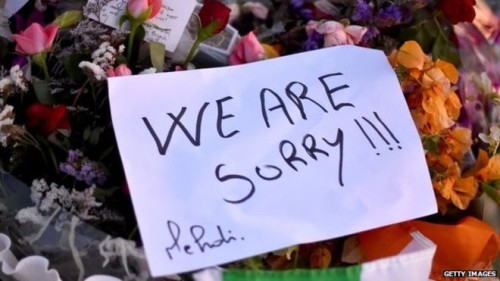PHOTO: A message of condolence after Friday’s attack by a gunman that killed 39 people in Sousse in Tunisia (Getty)
Berny Sebe of the University of Birmingham writes for The Guardian:
The blood and tears spilled on the beach at Sousse on Friday seem to have caught many off guard –– including the Tunisian authorities, in spite of their commitment to making the country safe for tourists. But what appears to be an attempt to export the ideology of the Islamic State from Iraq and Syria to the Maghreb can also be seen as a re-branding of movements that have existed for decades.
The attack is certainly aimed at destabilizing the only successful case study of the so-called Arab Spring, which also happens to be the origin of that movement. Yet by launching this attack, or at least endorsing it, ISIS and its local affiliates intend to achieve several further goals.
First, the killings are a shocking demonstration that terrorist groups have retained the ability to strike in Tunisia, three months after the attack on the Bardo museum and the subsequent crackdown on radical Islamist groups. While the mounting of a single-killer attack can itself be seen as evidence of operational weakness, it is also a stark reminder that the threat has not disappeared. Second, it marks a powerful resurfacing of armed Islamism in an area with a long history of that problem. Third, it brings global jihad closer to Europe in a spectacular way.
The stability of the Tunisian State and its transition from an autocratic regime to a post-revolutionary democracy, with political Islam represented through the Ennahda party, had led many to forget the long shadow of Islamist militant activism in the country.
Reacting against the violent suppression of the Ben Ali years, Islamists in Tunisia oscillated between two strategies: refusing the use of violence in spite of the circumstances in the hope that international recognition would follow, and on the contrary going underground to pursue armed struggle. This divide has remained up until today.
The Sousse attack demonstrates that the success of ISIS elsewhere is capable of reviving the most radical Islamists in Tunisia. Existing local movements appear to have been absorbed into the new jihadi brand: the existence of an “Islamic State” in the Levant has given them new impetus. After all in Raqqa in northern Syria, Tunisian nationals are the single most important contingent of foreign fighters.
This convergence of local terrorism and international networks is not new to the region. It happened when Algerian groups that emerged during the “dirty war” of the 1990s decided in 2007 to become a franchise of Al Qa’eda.
However, while Al Qa’eda put global jihad first, seeing the caliphate as an ultimate goal, ISIS has swapped priorities. It seeks to create the caliphate wherever possible, and use these areas as springboards to launch global jihad. With radical groups now claiming to operate on behalf of ISIS in Libya and occasionally in Algeria, it is Tunisia, with its history of political Islamism, that appears to be the next target.
Beyond Tunisia, Europe’s security is at stake: the continent is the West’s softer target. Although it remains to be seen whether there was any coordination between the beheading of a French man near Grenoble, the bombing of a Shia mosque in Kuwait and the Sousse attack — all perpetrated on the second Friday of the holy month of Ramadan — these three events tell us a lot about the logic of global jihad as implemented by Isis. It feeds on local grievances and existing networks to expand and propagate its own ideology, encapsulated in the concept of the caliphate.
This is the deadly power of the franchise. The challenge now is to try to prevent it winning further victories. It does not bode well that the model has succeeded in a state such as Tunisia, with its relative stability and newly minted democratic government. We can only hope that any response does not endanger the precious freedom and openness Tunisians have achieved.

